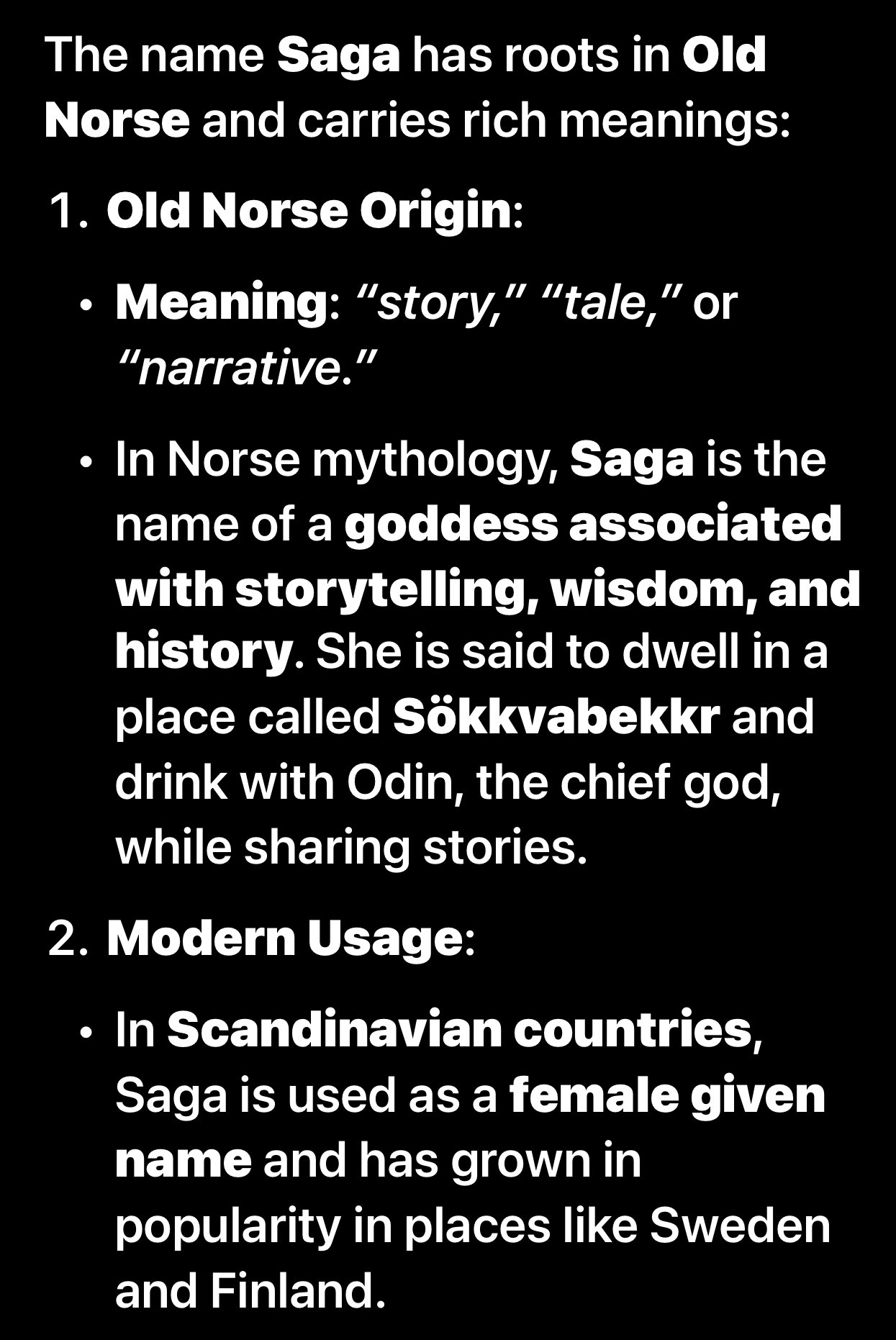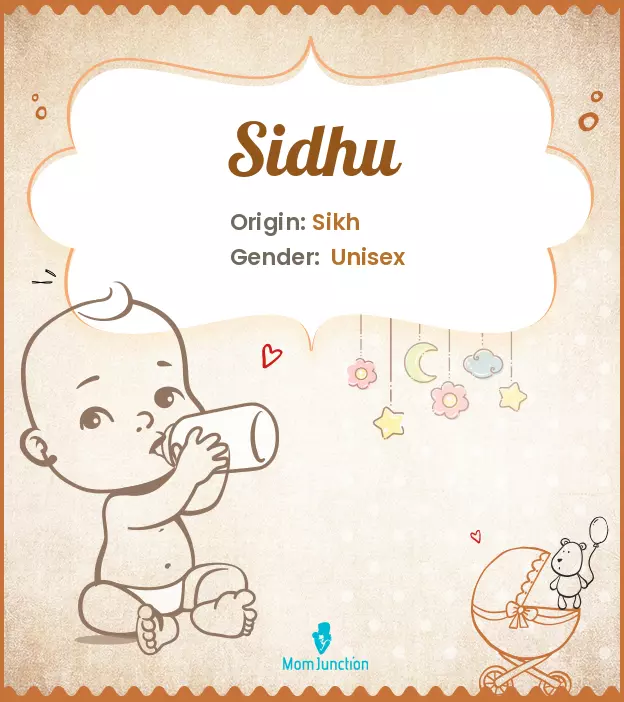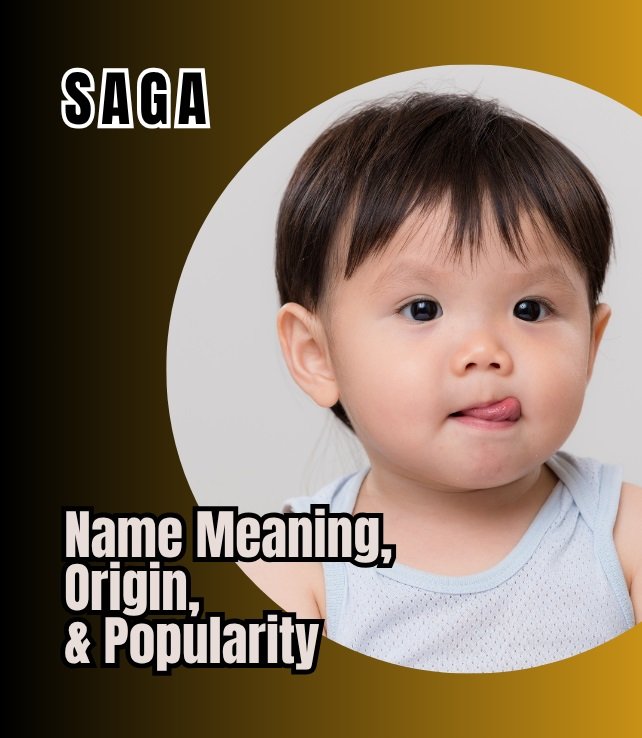Have you ever wondered about the magic behind a name? “Saga” might just be the unique gem you’re looking for.
It carries a melody of history, culture, and a hint of mystery. But what exactly does this name mean? Where did it originate? And why is it gaining popularity? By the time you finish reading, you’ll not only understand the significance of “Saga,” but you’ll also discover why it might be the perfect choice for your future child or character.
Dive in to unveil the charm and allure of “Saga” and see if it resonates with you on a deeper level.

Credit: x.com
Etymology And Origins
Saga, a name of Swedish origin, means “story” or “tale” in Old Norse. Popular in Scandinavian countries, it reflects a rich cultural heritage. This name has gained attention for its unique and narrative essence.
The etymology and origins of a name can often reveal fascinating insights into cultural history and personal identity. Understanding where a name like Saga comes from can deepen your appreciation for its significance and uniqueness. Names carry stories, traditions, and meanings that shape our perception and connection to them.
Etymology Of The Name Saga
Saga, a name steeped in history, has roots in Old Norse language. It is derived from the word “saga,” meaning “story” or “narrative.” This reflects the tradition of storytelling in Norse culture, where sagas were epic tales of heroes and adventures.
Have you ever considered how a name can embody an entire tradition? In Scandinavian folklore, sagas were not just stories; they were a vital way to preserve history and lessons.
Origins In Scandinavian Culture
The name Saga is closely linked to Scandinavian heritage. It is often associated with mythology and literature from Iceland and Norway. In these regions, sagas were a revered form of writing, capturing the essence of the Viking age.
Imagine naming your child after a legacy of powerful narratives and legendary figures. Saga is not just a name; it’s an homage to a rich cultural past.
Modern Usage And Popularity
Saga has seen a resurgence in popularity in recent years, especially in countries like Sweden and Norway. Its historical significance makes it appealing to those who value tradition and storytelling.
Why do you think people are drawn to names with cultural depth today? Perhaps it’s a way to connect with one’s roots or to embrace a name that carries a sense of timelessness.
Choosing a name like Saga can be a meaningful decision, linking your child to a world of stories and heritage. It’s a name that stands out, not just for its sound, but for the rich tapestry of history it represents.
Cultural Significance
Saga, a name rich in cultural history, originates from Scandinavia. It signifies storytelling and wisdom. Rising in popularity, it holds a timeless appeal, resonating with those who cherish heritage and tradition.
Cultural significance plays a crucial role in understanding the depth behind a name. The name “Saga” is no exception. It carries rich cultural weight, offering insights into diverse traditions and histories that have shaped its meaning and popularity over time.
The Nordic Roots Of Saga
Saga hails from the Nordic countries, where it is steeped in myth and legend. In Norse mythology, Saga was a goddess associated with storytelling and history. Imagine naming your child after a deity celebrated for wisdom and tales of old.
Modern Popularity In Scandinavian Countries
In countries like Sweden and Norway, Saga is a popular name choice. Its melodic sound and cultural heritage make it appealing to modern parents. It’s fascinating how a name can bridge ancient traditions with contemporary naming trends.
Symbolism In Literature And Art
Saga extends beyond mythology into literature and art. It often symbolizes epic tales and grand narratives. Have you ever thought about the stories your name could tell if it were a book or a painting?
Global Awareness And Usage
While rooted in the Nordic region, Saga’s charm has crossed borders. It is gaining traction in English-speaking countries as well. This global awareness adds a unique dimension, making it an excellent choice for those who appreciate cultural diversity
Personal Connection To Cultural Heritage
Choosing a name like Saga can be a way to honor one’s heritage. It can also serve as a conversation starter about cultural identity. Wouldn’t it be intriguing to share the story behind your name at gatherings or in new social settings?
Influence Of Popular Media
Popular media has also played a part in Saga’s rising popularity. Characters named Saga in books, movies, and TV series have introduced the name to wider audiences. This media influence can shape perceptions and inspire parents seeking a name that is both unique and meaningful.
Understanding the cultural significance of a name like Saga goes beyond its surface appeal. It invites you to explore stories and traditions that enrich our understanding of identity. What stories could your name tell?
Trends In Popularity
Saga, a name with roots in Scandinavian culture, is gaining popularity worldwide. Meaning “story” or “tale” in Old Norse, it appeals to parents seeking unique and meaningful names. Its rise in use reflects a trend towards embracing cultural heritage and distinctiveness in naming.
Understanding the trends in the popularity of the name Saga can be both fascinating and enlightening. While names like Emma and Liam have consistently topped the charts in recent years, Saga offers a unique charm and historical depth that appeals to many. As more parents seek distinctive names for their children, Saga is steadily gaining traction. But what truly drives the popularity of a name like Saga? Let’s delve into the trends and see how this name has evolved over time.
Historical Popularity
Saga’s roots are deeply embedded in Norse mythology, where it represents a goddess of storytelling and history. This rich heritage makes it an attractive choice for parents interested in names with historical significance. Over the decades, names inspired by mythology have seen waves of popularity, and Saga’s recent rise mirrors this trend.
Geographical Influences
In Scandinavian countries, Saga has been a familiar choice for generations. As global cultures blend more seamlessly, names that were once region-specific are finding homes in diverse settings. If you’re intrigued by unique names with cultural significance, Saga might be the perfect fit for your little one.
Pop Culture Boost
Names often experience a surge in popularity thanks to pop culture influences. Whether through popular TV series, books, or movies, characters named Saga have brought attention to this enchanting name. If you find yourself influenced by a beloved character, you’re not alone—many parents choose names inspired by their favorite stories.
Celebrity Choices
Celebrities have a knack for setting trends, and when they choose a name like Saga for their children, it often causes a ripple effect. This can lead to a spike in the name’s popularity as fans and followers are inspired by their choices. Have you ever found yourself considering a name simply because a celebrity did?
Modern Appeal
In an era where individuality is celebrated, Saga stands out with its simplicity and strength. It’s a name that’s easy to spell, pronounce, and remember, making it appealing to many parents. Are you looking for a name that blends uniqueness with timelessness? Saga might just be the perfect choice.
The name Saga is not just a nod to the past but a promising name for the future. Its growing popularity is a testament to its enduring appeal and the trend toward names that offer both uniqueness and depth. As you explore names for your child, consider what makes a name truly special to you. Is it its sound, its meaning, or the story it tells? Whatever your criteria, Saga offers a rich tapestry of history and modern allure.

Credit: www.momjunction.com

Credit: www.youtube.com
Frequently Asked Questions
Is Saga A Common Name In Sweden?
Saga is a popular name in Sweden, especially among girls. It has cultural significance and is widely used. The name Saga is linked to storytelling and Nordic mythology, making it appealing to Swedish parents. Its popularity continues to grow, reflecting its deep roots in Swedish culture.
What Is The Origin Of Saga?
Saga originates from Old Norse language, referring to stories or historical accounts. Norse sagas narrate Viking adventures, legendary heroes, and ancient Scandinavian history. They emerged during the medieval period, mainly in Iceland, and are considered key cultural and literary contributions.
Sagas blend mythology, history, and folklore, capturing Scandinavian heritage.
What Does The Name Saga Mean In English?
The name “Saga” means a long story of heroic achievements in English. It can also refer to a Norse goddess associated with storytelling.
What Is The Common Name For Saga?
Saga is commonly known as the “Red Sandalwood Tree” or “Coralwood Tree”. It is celebrated for its vibrant red seeds and cultural significance in various traditions.
Conclusion
Saga stands as a strong, meaningful name with deep roots. Its origins connect to tales and stories. Simple yet powerful, it resonates with history. This name holds appeal for many around the globe. Parents find it unique and memorable. Saga’s popularity grows steadily each year.
A timeless choice, it fits any generation. Choosing Saga means embracing a name with rich heritage. It carries a sense of adventure and wisdom. Perfect for a child destined for great stories. Its charm and depth are undeniable. Saga is truly a name with lasting impact.

